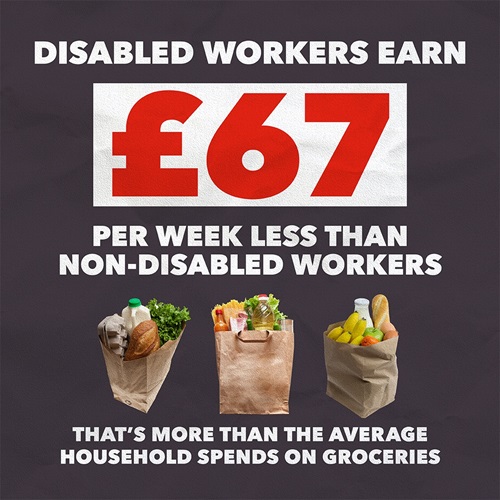NUJ’s Disabled Members’ Council calls for industry action to address the disability pay gap
Latest analysis published by the TUC shows that non-disabled workers earn around a sixth (14.6%) more than disabled workers.
The analysis reveals that the pay gap for disabled workers across the board is £1.90 an hour, or £66.50 per week – over what the average household spends on their weekly food shop (£62.20).
That makes for a pay difference of £3,460 a year for someone working a 35-hour week – and means that disabled people effectively work for free for the last 47 days of the year and stop getting paid today, on the day the TUC has branded Disability Pay Gap Day.
The pay gap is also linked to unlawful discrimination, structural barriers, a lack of access to flexible working, employers failing to provide reasonable adjustments and negative attitudes.
The TUC research identifies the main factors driving the pay and employment gap for disabled people including:
- Part-time working: a higher proportion of disabled people than non-disabled people work part-time. Part-time jobs, especially in the private sector, are paid less per hour than fulltime jobs.
- Low-paid work: disabled people are over-represented in lower paid jobs and under-represented in senior and managerial roles.
- TUC slams “zero progress” on disability pay gap in last decade
Natasha Hirst said, NUJ president and disabled members’ rep, said:
“It’s disgraceful that disabled people continue to be undervalued and disadvantaged at work. It’s time for employers to make more progress with removing barriers that prevent disabled workers from progressing their careers to reach senior and decision-making roles. Ensure that appropriate reasonable adjustments are in place and provide genuine opportunities for career progression. Editors can also increase their pool of disabled freelancers to bring greater diversity to the work they commission.
“Disabled people are proportionally more likely to be self-employed. Freelances in the creative industries and journalism experience precarity of work and income and lack of sick pay. Inadequate social security support, such as Universal Credit makes managing fluctuating income especially hard and increases income inequality.”
Ann Galpin, co-chair of TUC Disabled Workers’ Committee and chair of the NUJ Disabled Members’ Disabled Council, said:
“There has been zero progress in a decade. This year’s figures re-confirm that disabled women bear the brunt end of this discriminatory pay gap, earning 30% (£3.73 an hour, £130.55 a week, or £6,780 a year) less than non-disabled men.
"As a union, we’d welcome more robust data on the differences among disabled freelances as disabled members are proportionally more likely to be self-employed. Freelances in the creative industries and journalism experience precarity of work and income and lack of sick pay. Inadequate social security support, such as universal credit makes managing fluctuating income especially hard and increases income inequality.”
Support for members:
The NUJ Disabled Members Council is holding an informal session online on Monday 27 November from 6-7pm to give disabled members a chance to hear an update from the council and answer any questions.
NUJ members who are experiencing difficulties securing reasonable adjustments, or are concerned about discrimination or unfair treatment at work should contact a workplace rep or a union official – contact details available via the website.
If you identify as disabled or have a health condition, please update your membership profile via the website login so we can keep you up to date with news for our disabled members.
If your circumstances have changed and your income has dropped, contact the membership department [email protected] to find out if you are eligible for a reduction in subs.
NUJ Extra is also available for members experiencing financial hardship. More information on the website.
#DisabilityPayGap

